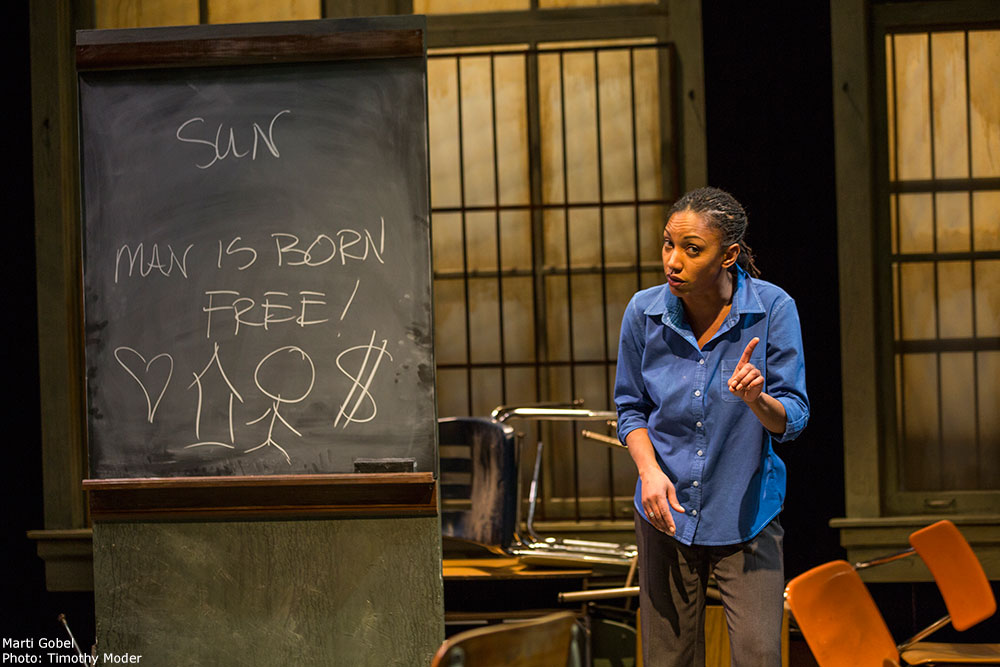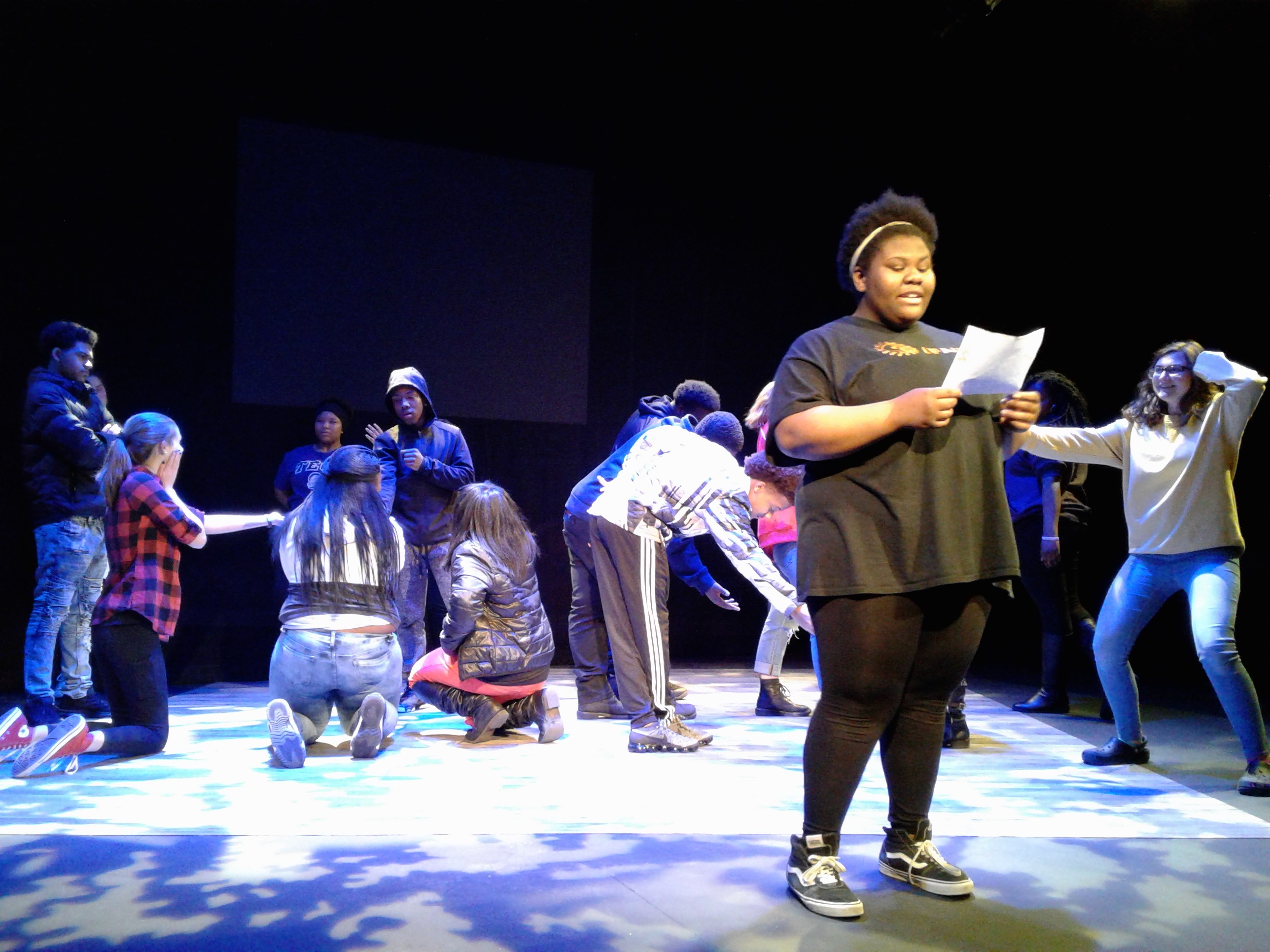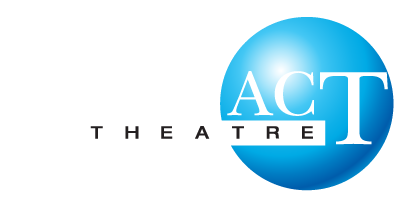From Good to Excellent: One Teacher’s Journey
By Marti Gobel, director, PRINCIPAL PRINCIPLE
There is a vast difference between becoming a teacher and actually becoming good at teaching. I am sure that all of us can recall a specific teacher who moved us forward in our education process with skill and palpable joy. How to describe them? What makes the good ones stand out in our minds? In approaching the directing of PRINCIPAL PRINCIPLE by Joe Zarrow, I found that I kept asking myself: What is a good teacher?
Well, at the most basic level, a good teacher is one who has a positive impact on those being taught. One who is able to break down the complexities of any given subject and simplify it in a way that creates a path for long-lasting and ever-growing understanding. A good teacher is one who teaches to the learner rather than to the test. Of course, every educator is different. These differences are partly responsible for the tapestry of humanity that we live in today.
In my twenties, I wanted to be a good teacher.
I have been trained to teach as far back as I can remember. My mother, an award-winning high school History, English and Art History educator, was also a single mother with three small children to care for. For practical purposes, this meant that my siblings and I were with her during all aspects of her professional career. I went with her to the school where she taught, to prep her room long before the students arrived for the first day of classes. While she taught night school, I sat under her desk and read the stories I found in the textbooks. I recall being enthralled, while eating donuts and drinking heavily creamed coffee, during some heated school board meetings. Eventually, my mother and I co-taught at multiple seminars for educators during my first years of college at San Diego State University, where I was working toward my degree in Secondary Education.

After several years of working as a facilitator for San Diego Unified School District, I chose to veer from the path that had been laid out for me. Much to my mother’s chagrin, I abandoned the notion of following in her footsteps. There simply came a point where I decided I did not want to teach grammar and sentence structure to a never-ending stream of reluctant learners with the occasional hungry mind thrown into the mix. I did not want the monotony of writing lesson plans, grading papers, answering to the administration and constantly engaging in a system that, in my eyes, took the fun out of teaching and learning.
Years later, having set my teaching career to the side, I would graduate from UW-Whitewater with a degree in Performance Theatre and Philosophy. My alma mater offered me the opportunity to study at the John F. Kennedy Center for the Arts. My time there (which, included a rigorous re-training on how one effectively teaches) was eye-opening for me. My colleagues and I were introduced to the notion that for a student to demonstrate an understanding of any given subject, it was not necessarily true that this could only be accomplished through testing. Furthermore, allowing students to show that they understood, in their own unique way, was far more effective for the creation of positive, inventive, and learned contributors to society. This approach to teaching ensured that all of the students would receive the same level of support and energy regardless of their ability to memorize information for a formal examination, thereby creating a culture of learning that reduced anxiety and leveled the playing field for demonstrating knowledge. I was beyond impressed with this new-tome philosophy on education, particularly because in order for it to work effectively, it required the use of my own skills as an artist as a jumping off point.
I left the Kennedy Center for the Arts armed with several Residency Plans that had been meticulously reviewed and approved by the brilliant staff there. And, I went back to teaching. This time not because I wanted to be a good teacher but because I wanted to be an excellent teacher.
What is an excellent teacher? An excellent teacher is one who is deeply committed to the act of imparting knowledge. One who is aware of the tremendous power they have to influence their students and reserves no effort in developing intellect, but also the character and life skills of the student. One who has not the primary goal of answering to an administrative designed rubric but rather wishes to contribute to the crafting of a mind.
Now, when I enter a new situation in the capacity of teacher, I begin with telling my students, be they 5 or 25, that they should not fear being wrong when they engage in class discussions because the wrong answers will lead us all to the right answers. I inform them that I will be teaching them Socratically; that is, through discussion. I tell them that we will discuss, move and develop our time together, together. I tell them that they will have time to work alone, in small groups and as one community. I remind them that they already know so very many things and that I simply seek to add to that. Then, I warm them up. Always included in the warm up are key elements of what I need them to learn during our session. On paper, it looks like this:
ME: When I say Civil, you say Rights… Civil
STUDENTS: Rights (3x)
ME: When I say Bus, you say Strike… Bus
STUDENTS: Strike (3x)
ME: Now, when I say Justice you say Law… Justice
STUDENTS: Law (3x)
ME: And when I say Voting, you say All… Voting
STUDENTS: All (3x)
My warmup is based on the West African tradition of Call and Response. It requires that I “call” something and that the students ”respond.” It is a full body exercise designed to address all of the learning styles found in a group of students at once. I can manipulate the calls I give to increase the difficulty in how they respond. I can add new information. I can adjust quickly and seamlessly should they need more time with a topic. We are together. I do the call from the center of a circle made up of the students. Because of the rhythmic pacing of the call, the students cannot not pay attention while they listen and respond. Soon they begin to move with abandon. This means they are learning with abandon. It is a sight to behold.

If you were a fly on the wall during one of these sessions, you would see what I feel. As they move through the exercise, the students tighten the circle, closing the distance between teacher and student. They move to me. They move to the source. From the center of that circle, I can kinetically experience their willingness to learn. I have proof that they are actively engaging in the lesson. There is no test anyone can give to come to that conclusion. We all just feel it.
I have taught everything from Method Acting to Fractions with my Call and Response formula. How do I know they have increased knowledge? I ask them. Included in the Call and Response warmup is a great deal of repetition. They hear, and see, and move and process all at once. Everyone’s learning style is addressed throughout the whole exercise. With just the warm up, I can introduce the themes of that day. With the text included above, I can go anywhere with the topic of Civil Rights: the Birmingham Bus Strike, Justice, Law, Voting and the concept of All. There is no written test. Only expressing and learning with abandon. And at the end of the session, they need no prompt to answer the call. It is an incredibly effective way to teach. I have seen this philosophy of teaching operate successfully time and time again.
I am now an adjunct lecturer at multiple universities in Wisconsin. The lessons from my mother, the program at San Diego State University, the many professors I had at UW-Whitewater and my training at the Kennedy Center for the Arts have all come together to create the type of teacher I am today. That is, a teacher who is engaging, energetic, empathetic and accepting. My reward? Not the paycheck. Not the test scores. Not the praise from my department heads. I am rewarded when a student follows me after class, wanting to learn more because they “got it” and because they enjoyed the experience of learning. I am rewarded when I witness students moving to the knowledge and are not forced to do so. That is excellence to me.
“That which touches me most is that I have a chance to work with people. Passing on to others that which was passed on to me.” – Sweet Honey In The Rock
PRINCIPAL PRINCIPLE will run online February 15 – March 7. For tickets, click here or call our ticket office at (414) 278-0765.
